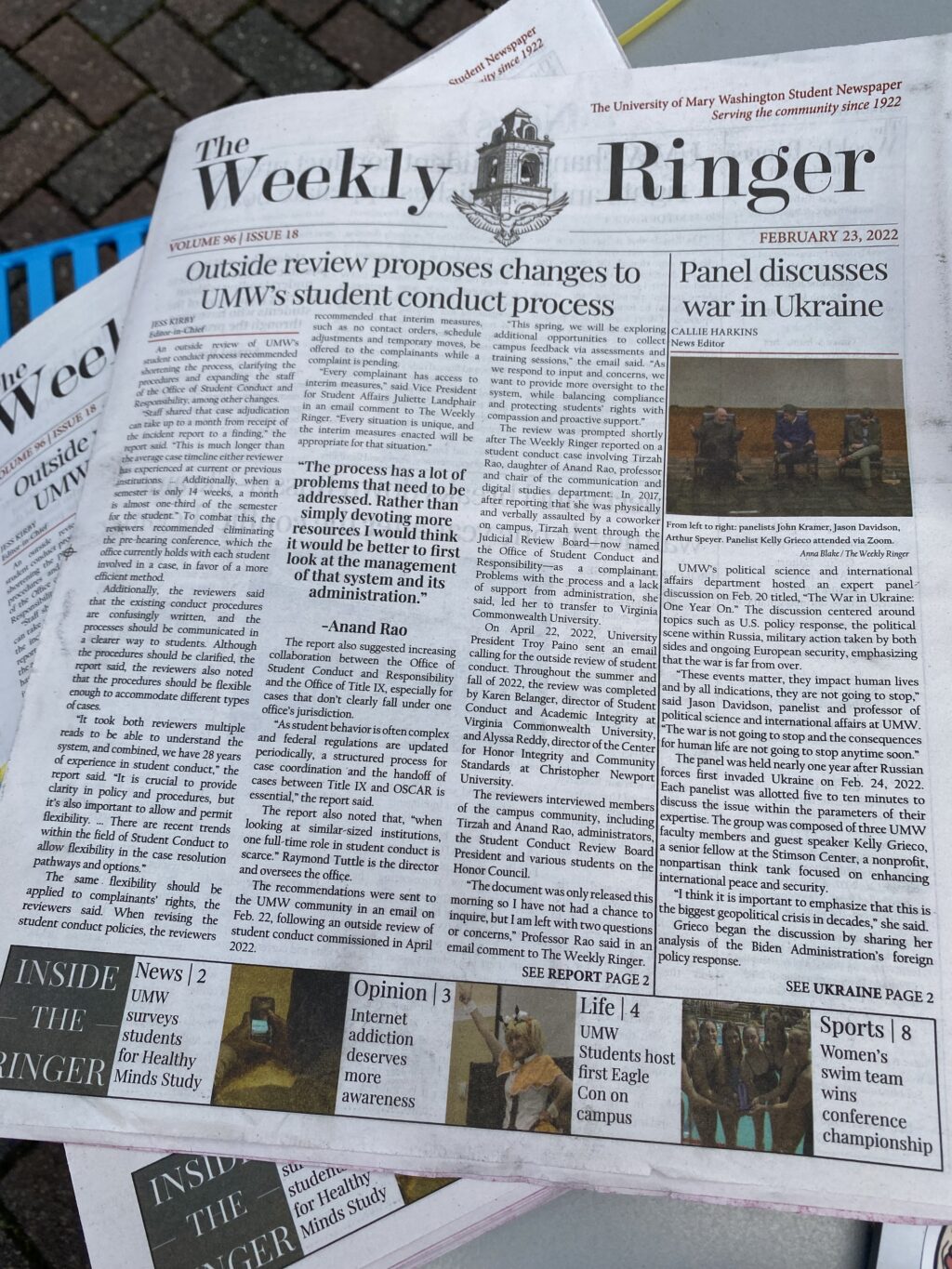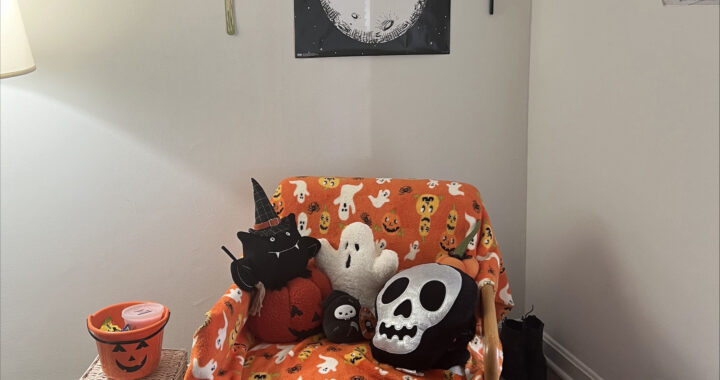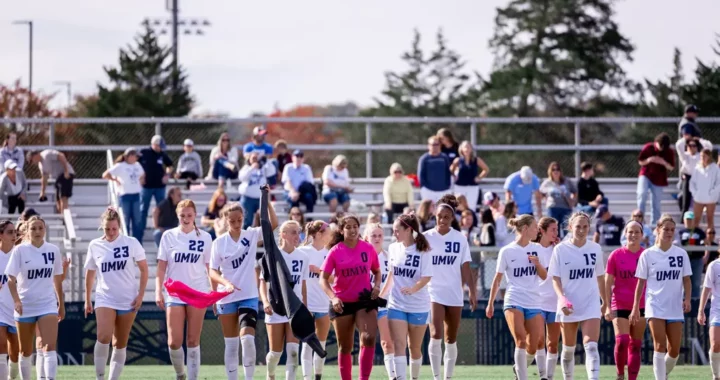Staff Editorial: Proposed Florida bills threaten free speech and protections for journalists
4 min read
The Weekly Ringer is the independent student newspaper at UMW. | Jess Kirby, The Weekly Ringer
THE WEEKLY RINGER EDITORIAL BOARD
Two recent bills in Florida, House Bill 991 and Senate Bill 1220, propose legislation that would attack journalists’ credibility and make it easier to sue them for defamation. If passed, this legislation would have harmful impacts on journalism in the state and potentially on the federal level as well. The Weekly Ringer editorial board stands against any such legislation, as these bills represent widespread attacks on First Amendment rights.
Although concerning for many reasons, the main point that makes these bills stand out is how they broaden when someone could sue for defamation. By definition, defamation is the act of damaging one’s reputation by communicating false statements about them, but it is regularly—and incorrectly—argued to pertain to when negative comments are made about a person. To avoid this, legal precedent has made defamation hard to prove in order to prevent people, and especially journalists, from being sued for reporting and making such comments.
Related to additional protections afforded to journalists, the 1964 case New York Times v. Sullivan set the precedent that in order to prove that a public official was defamed, the public official must prove “actual malice.” In journalism, this means that a journalist would have knowingly published false information or had a “reckless disregard of the truth.”
Filed on Feb. 21, Florida HB 991 would take away the requirement that public figures prove actual malice “when the allegation does not relate to the reason for his or her public status,” according to the bill. Therefore, if a public official were criticized for something unrelated to their government work, such as an action they took in their personal life, it would be much easier for them to argue defamation.
Perhaps even more concerning, the bill also proposes that in defamation cases, “a statement by an anonymous source is presumptively false for purposes of a defamation action,” which means that information obtained through anonymous sources would be discredited at first glance. This attacks journalists’ credibility by invalidating anonymous sources automatically.
In journalism, the standards of when anonymity is granted are high, and such a request is only permitted when there are serious interests at stake. In our personal experience, we have granted anonymity to resident assistants who fear losing their job for speaking with us, as well as to students who are willing to provide quotes relating to sensitive matters, such as cheating, which could land them in serious trouble with the school and ultimately have a negative impact on their overall reputation. Anonymous sources are also vital when reporting on violent crimes on campus, as it allows survivors to share their stories without the threat of retaliation.
If we were to invalidate these commentaries by having to automatically determine that they were false, we would be missing influential and highly important perspectives on campus that need to be represented and reported on. Journalists should be trusted to decide when anonymity is necessary. Immediately discrediting the words of anonymous sources removes journalists’ power to give voice to the voiceless, effectively silencing journalists and the sources they aim to protect through anonymity.
In addition, a second bill filed on Feb. 27, SB 1220, elaborates on the standard for unidentified sources of a defamatory statement. When a journalist reports a defamatory statement attributed to an anonymous source, the subject of said statement only has to prove that the journalist was negligent in reporting such. This dangerously lowers the standard needed to prove defamation, indicating a lack of trust in journalists to properly choose reputable sources and decide when anonymity is necessary.
This means that journalists who are trying to represent a slew of different perspectives and interests in their work—while also attempting to protect people who may fear for their reputation or job status if named—would be at fault if the statements given by anonymous sources were found to be defamatory. This standard only perpetuates censorship, for people already have to seek anonymity to avoid persecution for their words. If journalists could be damaged by reporting these statements, then they may choose not to use anonymous sources at all.
These bills have the potential to be destructive on the federal level as well; if they make it to codification in Florida, they will most likely end up in the U.S. Supreme Court for being in violation of the First Amendment. If the court decides this bill is constitutional, it could overrule New York Times v. Sullivan, taking away journalists’ established protection from wrongful defamation suits.
Journalists at all levels, from high school to the most esteemed publications, make mistakes. But when we realize we’ve made a mistake, we always strive to correct it. The world we report on is confusing and ever-changing, and in trying to keep up, we have to move quickly. To have no room to make mistakes will discourage journalists from pursuing the daring, groundbreaking work that holds our institutions and elected officials accountable.
As journalists, we understand the pressure of ensuring that we report the truth, and we especially understand the need for freedom of speech as we complete this task. In addition, we are bound by ethical standards, which, according to the Society of Professional Journalists, make us responsible to “Seek Truth and Report It,” “Minimize Harm,” “Act Independently” and “Be Accountable and Transparent.” Furthermore, as journalists, we understand the influence and privilege of being protected by the First Amendment and other related legislation that allows us to freely speak, even if we choose to speak out against our government. We realize that this is a privilege that not everyone has, and it is a pinnacle to American democracy that must be upheld.
This staff editorial was led by Norah Walsh.


